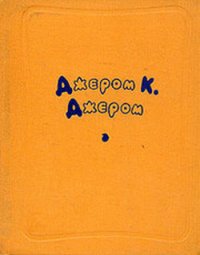Three Men on the Bummel - Jerome Jerome Klapka (лучшие бесплатные книги .TXT) 📗
But I am haunted by the suspicion you might skip all this. Were you sufficiently conscientious-or weak-minded enough-not to do so, I should, all said and done, succeed in conveying to you only an impression much better summed up in the simple words of the unpretentious guide book:
"A picturesque, mountainous district, bounded on the south and the west by the plain of the Rhine, towards which its spurs descend precipitately. Its geological formation consists chiefly of variegated sandstone and granite; its lower heights being covered with extensive pine forests. It is well watered with numerous streams, while its populous valleys are fertile and well cultivated. The inns are good; but the local wines should be partaken of by the stranger with discretion."
Chapter VI
Why we went to Hanover-Something they do better abroad-The art of polite foreign conversation, as taught in English schools-A true history, now told for the first time-The French joke, as provided for the amusement of British youth-Fatherly instincts of Harris— The road-waterer, considered as an artist-Patriotism of George— What Harris ought to have done-What he did-We save Harris's life— —A sleepless city-The cab-horse as a critic.
We arrived in Hamburg on Friday after a smooth and uneventful voyage; and from Hamburg we travelled to Berlin by way of Hanover. It is not the most direct route. I can only account for our visit to Hanover as the nigger accounted to the magistrate for his appearance in the Deacon's poultry-yard.
"Well?"
"Yes, sar, what the constable sez is quite true, sar; I was dar, sar."
"Oh, so you admit it? And what were you doing with a sack, pray, in Deacon Abraham's poultry-yard at twelve o'clock at night?"
"I'se gwine ter tell yer, sar; yes, sar. I'd been to Massa Jordan's wid a sack of melons. Yes, sar; an' Massa Jordan he wuz very 'greeable, an' axed me for ter come in."
"Yes, sar, very 'greeable man is Massa Jordan. An' dar we sat a talking an' a talking-"
"Very likely. What we want to know is what you were doing in the Deacon's poultry-yard?"
"Yes, sar, dat's what I'se cumming to. It wuz ver' late 'fore I left Massa Jordan's, an' den I sez ter mysel', sez I, now yer jest step out with yer best leg foremost, Ulysses, case yer gets into trouble wid de ole woman. Ver' talkative woman she is, sar, very— "
"Yes, never mind her; there are other people very talkative in this town besides your wife. Deacon Abraham's house is half a mile out of your way home from Mr. Jordan's. How did you get there?"
"Dat's what I'm a-gwine ter explain, sar."
"I am glad of that. And how do you propose to do it?"
"Well, I'se thinkin', sar, I must ha' digressed."
I take it we digressed a little.
At first, from some reason or other, Hanover strikes you as an uninteresting town, but it grows upon you. It is in reality two towns; a place of broad, modern, handsome streets and tasteful gardens; side by side with a sixteenth-century town, where old timbered houses overhang the narrow lanes; where through low archways one catches glimpses of galleried courtyards, once often thronged, no doubt, with troops of horse, or blocked with lumbering coach and six, waiting its rich merchant owner, and his fat placid Frau, but where now children and chickens scuttle at their will; while over the carved balconies hang dingy clothes a-drying.
A singularly English atmosphere hovers over Hanover, especially on Sundays, when its shuttered shops and clanging bells give to it the suggestion of a sunnier London. Nor was this British Sunday atmosphere apparent only to myself, else I might have attributed it to imagination; even George felt it. Harris and I, returning from a short stroll with our cigars after lunch on the Sunday afternoon, found him peacefully slumbering in the smoke-room's easiest chair.
"After all," said Harris, "there is something about the British Sunday that appeals to the man with English blood in his veins. I should be sorry to see it altogether done away with, let the new generation say what it will."
And taking one each end of the ample settee, we kept George company.
To Hanover one should go, they say, to learn the best German. The disadvantage is that outside Hanover, which is only a small province, nobody understands this best German. Thus you have to decide whether to speak good German and remain in Hanover, or bad German and travel about. Germany being separated so many centuries into a dozen principalities, is unfortunate in possessing a variety of dialects. Germans from Posen wishful to converse with men of Wurtemburg, have to talk as often as not in French or English; and young ladies who have received an expensive education in Westphalia surprise and disappoint their parents by being unable to understand a word said to them in Mechlenberg. An English-speaking foreigner, it is true, would find himself equally nonplussed among the Yorkshire wolds, or in the purlieus of Whitechapel; but the cases are not on all fours. Throughout Germany it is not only in the country districts and among the uneducated that dialects are maintained. Every province has practically its own language, of which it is proud and retentive. An educated Bavarian will admit to you that, academically speaking, the North German is more correct; but he will continue to speak South German and to teach it to his children.
In the course of the century, I am inclined to think that Germany will solve her difficulty in this respect by speaking English. Every boy and girl in Germany, above the peasant class, speaks English. Were English pronunciation less arbitrary, there is not the slightest doubt but that in the course of a very few years, comparatively speaking, it would become the language of the world. All foreigners agree that, grammatically, it is the easiest language of any to learn. A German, comparing it with his own language, where every word in every sentence is governed by at least four distinct and separate rules, tells you that English has no grammar. A good many English people would seem to have come to the same conclusion; but they are wrong. As a matter of fact, there is an English grammar, and one of these days our schools will recognise the fact, and it will be taught to our children, penetrating maybe even into literary and journalistic circles. But at present we appear to agree with the foreigner that it is a quantity neglectable. English pronunciation is the stumbling-block to our progress. English spelling would seem to have been designed chiefly as a disguise to pronunciation. It is a clever idea, calculated to check presumption on the part of the foreigner; but for that he would learn it in a year.
For they have a way of teaching languages in Germany that is not our way, and the consequence is that when the German youth or maiden leaves the gymnasium or high school at fifteen, "it" (as in Germany one conveniently may say) can understand and speak the tongue it has been learning. In England we have a method that for obtaining the least possible result at the greatest possible expenditure of time and money is perhaps unequalled. An English boy who has been through a good middle-class school in England can talk to a Frenchman, slowly and with difficulty, about female gardeners and aunts; conversation which, to a man possessed perhaps of neither, is liable to pall. Possibly, if he be a bright exception, he may be able to tell the time, or make a few guarded observations concerning the weather. No doubt he could repeat a goodly number of irregular verbs by heart; only, as a matter of fact, few foreigners care to listen to their own irregular verbs, recited by young Englishmen. Likewise he might be able to remember a choice selection of grotesquely involved French idioms, such as no modern Frenchman has ever heard or understands when he does hear.




